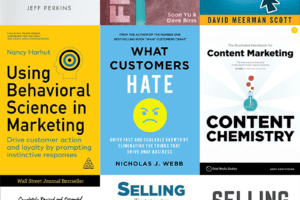Episode 53 of Yes, and Marketing
For the first episode as Yes, and Marketing (formerly The Verblio Show), Steve brings on famed improv actor, writer, director, and author Paul Vaillancourt to share how a “yes, and” mentality can be an incredibly powerful business tool. They also cover:
- The link between philosophy and comedy
- How to turn your partner into a genius
- The two types of listening
- How to hook an audience
- Why improv isn’t about being funny
Guest-at-a-Glance
???? Name: Paul Vaillancourt
???? What he does: Professional creative. Improv actor, director, producer, and writer. Author of The Triangle of the Scene.
????️ Find Paul on the web: LinkedIn | YouTube | Twitter
???? Get smart: “We can’t create and edit at the same time.”
Top Takeaways
Embrace ‘yes, and’ ????
Paul explains that at its most basic level, the concept of ‘yes, and’ means “accepting what’s there and adding to it.”
In improv, the rule of ‘yes, and’ allows your partner to know you will go along with—and add to—their ideas. They don’t have to worry about whether their idea is good because they can trust you to help bring it to life. Outside the theater, adopting a ‘yes, and’ mindset helps create a similar sense of trust and openness, whether at work or in your personal life.
“What we’re trying to take out of the mix is judgment,” Paul explains. “Judgment of ourselves. Judgment of the other person. Judgment of choices. We’re trying to be in the moment and not have judgment and just really support what’s happening. That’s ‘yes, and.’”
Make your partner look good ????
After 30 years as an improvisor, Paul says his biggest piece of advice is to “Have fun and make your partner look good.” On stage, improv actors succeed or fail together, and the same is true in other spheres as well.
When you focus on helping your partner—or your colleague or teammate—look good, you both win. If someone praises your latest project, share the success by giving credit to everyone else involved. Be generous with your ideas and bring in teammates to collaborate. Your entire team and business will benefit as a result.
Episode Highlights
Paul’s favorite improv game
“My favorite short form improv game is probably genre replay, where you play a scene and then you get a genre from the audience and you replay that scene in a different genre, and you do it for three or four different genres. I love that sort of alternate reality—like now it’s a western, now it’s a sci fi, and you get to use the signposts of the original scene, but you discover new things about the scene each time.”
Why “big, loud yeses” are important
“In the book The Triangle of the Scene, I talk about one exercise that so many people use as the foundational exercise of improv, called Ad Team. Basically, we get a product from the audience and then, like an ad team, we develop it. We say, ‘What’s new and different about it? What’s the tagline? What’s the name of the product? Who can we get to endorse it?’—all these sorts of things.
And the whole premise of the game is that as we’re doing this, every idea you hear is the best idea you ever heard, so you give it a big, loud yes. It’s like, ‘Okay, it’s a telephone.’ Great. And someone’s like, ‘It’s made of cheese.’
‘Yes!‘
And we say, ‘Yes,’ to that. And the reason it’s gotta be a big, loud yes—the reason I like that—is because it influences your body. You feel it physically. You feel that ‘Yes!’ energy.”
How to make your partner a genius
“Del Close said, ‘If we treat our partners as geniuses, they will be.’ And that really pulls all the way back together to ‘yes, and,’ and the Ad Game, where we are treating those other people like geniuses. Even the guy that says, ‘Hey, it’s a phone made of cheese,’ we say, ‘Yes!’ We act like that’s a genius idea, and then it is.”
In your head? Focus on others
“When people say, ‘Ah, I’m in my head,’ it’s because you’re thinking about yourself. ‘How do I make myself look good? What’s my funny thing I can say? What am I gonna do?’
The number one way to get out of your head is get into your partner. Focus on them. Really listen to what they’re saying. If you’re really listening to what’s coming in, and you’re taking it in and then you think of what you’re gonna say, you’ll have a much easier time than if they’re talking and you’re trying to think of what you’re gonna say while they’re talking.”
Anyone can learn the craft of improv—and some can make it an art
“Improv is a craft. Anyone can learn how to make a chair. Some people are gonna really make beautiful chairs—‘Oh my god, I’ve never thought of a chair like that before.’ It’s the same thing in improv. Anyone can learn the basics of improv and be stage-worthy and be good to do a show. And then some people, because they devote themselves to it, they can take that from craft to art.”
Paul’s “Fraction of Life” theory
“I have this theory called the ‘fraction of life’ theory. When you’re a kid, everything seems like it takes so long because it’s such a bigger fraction of your life. Versus when you’re an adult, waiting for an hour is like, ‘Only an hour? Great.’ But when you’re a kid, you’re pulling your hair out.”
Top Quotes
????️ Paul:
“Have fun and make your partner look good.”
“Being human is funny enough.”
“There’s listening to respond, and there’s listening where you’re just waiting for them to shut up so you can say your funny thing. And they’re two totally different things.”
“Once we take judgment out of it, our creativity really opens up.”
“We can’t write and edit at the same time. We can’t create and edit at the same time. We need to create, create, create, create. And then we edit, edit, edit, edit.”



